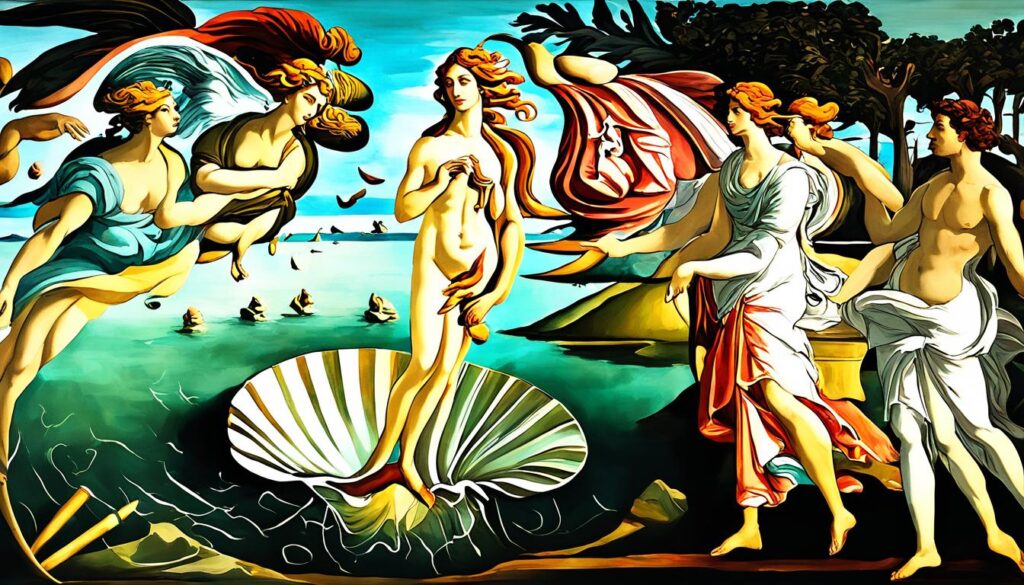If you’re a fan of historical fiction, you won’t want to miss out on the immersive experience of “The Birth of Venus” by Sarah Dunant, an audiobook set in Renaissance Italy. This captivating tale will transport you back in time to a world of political intrigue, art, and passion.
In this audiobook review, we’ll explore the strengths of “The Birth of Venus,” including its historical accuracy, writing style, and narration, as well as analyze its plot, characters, and themes. Join us on a journey through Renaissance Italy as we dive into the world created by Sarah Dunant.
Key Takeaways:
- Join us on an immersive journey through Renaissance Italy with “The Birth of Venus” audiobook by Sarah Dunant.
- Explore the historical accuracy, writing style, and narration that make this novel stand out.
- Analyze the plot, characters, and themes to get a deeper understanding of the story.
- Discover what the critics have to say about “The Birth of Venus” as an audiobook.
- Get our final recommendation on whether you should listen to this captivating novel.
About the Author – Sarah Dunant
Sarah Dunant is a renowned author of historical fiction, known for her captivating stories set in Renaissance Italy. Born in London in 1950, Dunant studied English literature at Cambridge University before a successful career in radio and television. Dunant published her first novel, “Snowstorms in a Hot Climate,” in 1990, marking the beginning of her impressive writing career.
Throughout her career, Dunant has written several critically acclaimed novels, including “In the Name of the Family” and “The Birth of Venus.” Her novels have been translated into over 30 languages and have won multiple awards. With a passion for historical research, Dunant brings the past to life through vivid storytelling, immersing readers in the rich and complex worlds of her characters.
Setting the Stage – Renaissance Italy
The historical setting of “The Birth of Venus” by Sarah Dunant is set in the captivating era of Renaissance Italy. This period spanning from the 14th to the 17th century, marked the transition from the Middle Ages to the Modern Era, and it was a time of renewal and creativity. The Italian Renaissance gave rise to innovative art, science, and ideas, making it one of the most significant and fascinating periods in European history.
During this era, Italy was divided into numerous city-states, each with their own unique cultures and political structures. The people of Renaissance Italy had a passion for knowledge and beauty, seeking to embrace all aspects of life fully. It was also a time of great social upheaval, characterized by significant changes in political structures, such as the fall of feudalism. Emerging power players vied for dominance throughout the region, with frequent conflict and shifting allegiances.
Artisanal ingenuity, theological vigor, and political intrigue were all integral parts of Renaissance Italy, and Sarah Dunant masterfully captures this historical setting with all its complexities and nuances. Dunant carefully sets the stage for the vast cast of characters in her novel, crafting a detailed and immersive experience that resonates with readers and listeners alike.
The Cultural Landscape
| Aspect | Description |
|---|---|
| Art | Renaissance artists aimed to capture the beauty and complexity of life using perspective and realism. They used scientific approaches to paint techniques, which resulted in delicate masterpieces. Some of the most prominent artists include Leonardo da Vinci, Michelangelo, and Sandro Botticelli. |
| Religion | The Catholic Church was the most dominant religious institution during Renaissance Italy. A significant chunk of the population was deeply religious, with the church heavily influencing their everyday lives. The church also played a significant role in politics and economics, making them a vital power player in the Italian Renaissance. |
| Science | Scientific advancement was one of the hallmarks of the Italian Renaissance. Great thinkers such as Galileo Galilei and Leonardo da Vinci made significant contributions to science, art, and math that are still studied and celebrated to this day. |
The Political Landscape
- The Papal States
- The Republic of Florence
- The Kingdom of Naples
- The Duchy of Milan
The Renaissance Italy political climate was characterized by regional fragmentation, with small, independent states dominating the land. The Papal States were the most extensive and influential city-states, with the Pope serving as the dominant power player. Florence was another significant player, with its Republic consistently employing artistic and intellectual brilliance to create some of Italy’s most cherished creations. Additional regions in Italy such as Naples and Milan had great political and cultural variance.
Plot Summary
“The Birth of Venus” by Sarah Dunant takes us on a journey through Renaissance Italy, where we meet our protagonist Alessandra, a young Florentine woman with a passion for art. The novel begins with a scene of Alessandra’s birth and early childhood, deftly establishing her close connection to her family and her fraught relationship with her strict, religious mother.
As Alessandra grows up, she struggles against the limitations placed on her as a woman in Renaissance society, particularly as she becomes increasingly interested in art and falls in love with a painter named Lorenzo. Her world is rocked by a series of dramatic events, including a plague outbreak and the arrival of a new, charismatic leader in Florence.
Throughout the audiobook, we see Alessandra navigate her way through these challenges, while also confronting the darker aspects of the Renaissance era, including religious violence and corruption. The audiobook culminates in a thrilling finale, as Alessandra fights to protect those she loves and find her place in a rapidly changing world.
Overall, “The Birth of Venus” is a rich and immersive historical novel that transports listeners to another time and place. With a cast of complex, compelling characters and a gripping plot, it’s a must-read for fans of historical fiction and anyone looking for a captivating story.
Character Analysis
In “The Birth of Venus” audiobook, the characters are unforgettable. Sarah Dunant has created a cast of complex individuals that enrich the story and take it to new heights.
Protagonist – Alessandra Cecchi
Alessandra Cecchi is the novel’s protagonist, a young girl from a wealthy Florentine family whose ambition is to become an artist. She is a rebellious spirit, fighting against the gender and class restrictions of Renaissance Italy. Throughout the audiobook, Alessandra develops from an innocent girl into a strong-willed woman who defies expectations.
Lucrezia and Erila
Lucrezia is Alessandra’s mother, who is initially presented as oppressive, but as the story progresses, the complexity of their relationship is explored. Erila, Alessandra’s maidservant, is a pivotal character who provides insights into the lives of working-class women in Renaissance Italy. Both these characters enhance the story’s depth and provide intriguing contrasts to Alessandra’s adventurous spirit.
The Medici Family
| Character | Role | Significance |
|---|---|---|
| Lorenzo de Medici | Ruler of Florence | He symbolizes political power and the Renaissance’s artistic flourishing. |
| Giovanni de Medici | Alessandra’s love interest | His romantic relationship with Alessandra symbolizes the impossible love story and the division between social classes. |
| Marco de Medici | Giovanni’s uncle | Marco is the villain of the story, representing the church’s oppression against artistic expression. |
The Medici Family is a significant presence in the novel, embodying the political and social landscape of Renaissance Italy. Lorenzo represents the artistic patronage and intellectual flourishing of the period, while Giovanni and his love for Alessandra symbolize the impossibility of making social differences. Marco, on the other hand, represents the church’s interference in art and the suppression of creative freedom.
Sarah Dunant’s “The Birth of Venus” audiobook uses its deeply drawn characters to give a nuanced understanding of Renaissance Italy, a place where history and art intersect.
Historical Accuracy and Research
“The Birth of Venus” audiobook is a testament to Sarah Dunant’s dedication to historical accuracy. The author’s thorough research process is evident in the immersive experience she creates for listeners. From language and dress to architecture and politics, every detail captures the essence of Renaissance Italy with remarkable precision.
| Aspect of Historical Accuracy | Description |
|---|---|
| Language | Sarah Dunant researches appropriate language, idioms, and colloquialisms used during the Renaissance period, aiding in the audiobook’s historical accuracy. |
| Clothing and Attire | The author pays attention to the clothing style of the Renaissance era, ensuring that the audiobook’s characters dress precisely as would have been fashionable during this time. |
| Architecture | The audiobook describes houses, buildings, and public works with great detail, helping to recreate the historical context for the listener. |
| Politics | The historical context is enriched with information about famous personalities, events, and power struggles, making it easier for the listener to immerse themselves in the political climate of the time. |
Writing Style and Narration
The writing style and narration are crucial aspects of any audiobook, and “The Birth of Venus” by Sarah Dunant is no exception. Dunant’s writing style is characterized by her attention to detail and her ability to immerse readers in the setting of Renaissance Italy. Her vivid descriptions of the period’s art, culture, and politics bring the story to life and transport readers to a different world.
Moreover, the narration of the audiobook is top-notch, with the voice actor providing a masterful performance that captures the essence of the novel’s characters and setting. The actor’s versatile voice adds nuance and depth to the narrative, making it more engaging and immersive for listeners. The combination of Dunant’s writing style and the actor’s narration results in a captivating storytelling experience that is sure to delight anyone interested in historical fiction.

Writing Style and Narration
| Pros | Cons |
|---|---|
| The author’s attention to detail makes the setting of Renaissance Italy come alive for readers. | The writing style may be too descriptive for some readers, slowing down the pace of the narrative. |
| The voice actor’s performance captures the essence of the characters and setting. | The actor’s voice may not appeal to all listeners, as personal preferences in narration vary. |
| The combination of writing style and narration creates a captivating storytelling experience. | None. |
Themes and Symbolism
One of the most prominent themes in “The Birth of Venus” is the power dynamic present in Renaissance Italy. The novel highlights the struggles of women during this patriarchal society, showcasing how societal norms of the time prevented women from achieving their dreams and potential.
The symbolism in the novel is also worth noting. The titular painting itself, “The Birth of Venus,” serves as a metaphor for the novel’s themes. Venus, the goddess of love and beauty, embodies the aspirations of the female characters in the story, their desire to be recognized and respected for their talents and abilities. Additionally, the painting depicts the female form in a way that challenges the societal norms of the time, highlighting the novel’s exploration of gender and power dynamics.
The image below provides a visual representation of the symbolism in the novel:
Overall, “The Birth of Venus” tackles complex themes that are still relevant today, including gender inequality and societal power dynamics. The use of symbolism adds an extra layer of depth to the narrative, allowing readers to glean insight into the characters’ motivations and the broader ideas conveyed in the story.
Pacing and Engagement
One of the most critical factors contributing to an audiobook’s impact is its pace and the ability to captivate its listeners. In the case of “The Birth of Venus,” the book’s pacing expertly blends tension and release, keeping the listeners engaged and entertained throughout the story.
The narration style also plays a vital role in maintaining the listener’s engagement. Sarah Dunant’s eloquent writing style and the narrator’s seamless delivery keep the narration flowing smoothly, immersing the listener in the captivating plot.
This audiobook’s momentum is consistently maintained, ensuring that listeners remain captivated and interested in the story without suffering from monotonous lulls. The plot’s pacing also effectively balances the historical aspect and the drama, delivering an enticing experience.
The overall pacing and engagement of “The Birth of Venus” are strong points in favor of the audiobook, making it a must-listen for anyone interested in historical fiction and Italian Renaissance.
Critical Reception and Reader Opinions
“The Birth of Venus” has received critical acclaim from prominent publications.
| Publication | Critic | Rating |
|---|---|---|
| The Guardian | Elizabeth Buchan | 4/5 |
| The New York Times | Jessica Treadway | Positive |
| Goodreads | Various Users | 4.0/5 |
Reviewer Elizabeth Buchan from The Guardian commends Sarah Dunant’s writing and notes, “Dunant’s attention to surroundings and her emotional intelligence make for a deeply satisfying read.” The New York Times reviewer, Jessica Treadway, praises the audiobook’s immersive experience, stating, “The Birth of Venus is a thrilling historical novel that captures the spirit of Renaissance Italy.” Readers on Goodreads also express enthusiasm for the audiobook, with an average rating of 4 out of 5 stars.
Overall, the critical reception for “The Birth of Venus” as an audiobook has been positive, with many praising Sarah Dunant’s writing style and the immersive experience of the narrative.
Conclusion
Overall, “The Birth of Venus” by Sarah Dunant is a captivating audiobook that vividly immerses listeners in the world of Renaissance Italy. Dunant’s excellent writing style, coupled with superb narration, makes for a thoroughly engaging experience.
The historical accuracy and thorough research behind the novel further enhance the credibility of the story, while the themes and symbolism create a thought-provoking environment, inviting listeners to contemplate the broader ideas presented in the story.
While some may find the pacing to be slow at times, it is essential to note that it contributes significantly to the overall immersive quality of the audiobook. The critical reception and positive feedback from readers further validate its quality and worth, making it a highly recommended listen for anyone interested in historical fiction or audiobooks in general.
Overall, “The Birth of Venus” is an excellent addition to any audiobook lover’s library and is sure to leave a lasting impression.



